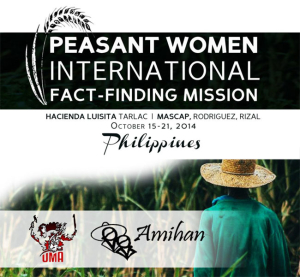“Land is at the very heart of human rights, of women’s rights.” The Peasant Women Fact-Finding Mission (IFFM) in Hacienda Luisita and in Mascap, Rodriguez, Rizal confirmed cases of landgrabbing involving high government officials in the Philippines. “Landgrabbing deprives women and their families of their right to livelihood, food and the safety and welfare of children, and other basic human rights guaranteed in international instruments and conventions,” said Zen Soriano, Chairperson of AMIHAN. The IFFM was held from October 16 – 19 and was organized by AMIHAN National Federation of Peasant Women and the Unyon ng mga Manggagawa sa Agrikultura (UMA). It consisted of more than 20 persons, 8 of whom were observers from international organizations, namely Australia, Indonesia, Malaysia and Taiwan. This included Sarah Marland, global coordinator of the Women Human Rights Defenders International Coalition (WHRIDC) and Kate Lappin, regional coordinator of the Asia Pacific Forum on Women, Law and Development (APWLD). The international observers would be releasing their own final reports. In Hacienda Luisita, the IFFM team observed the following:
- Direct landgrabbing by the Cojuangco-Aquino family, supplemented by the “tambiolo” (raffle draw) lot allocation scheme of the Aquino government, has deprived women and their families of the right to livelihood and their right to food.
- Part of the main harvest from palay is allocated for the family’s consumption and can usually support food or financial needs until the next harvest. Women who used to earn daily and augment the family’s income from growing and selling fruits and vegetables are now forced to take odd jobs or occasional domestic work as domestic workers or doing laundry. Women travel to nearby farms or plantations to become seasonal farmhands come planting or harvest time.
- Children and grandchildren of Luisita farmers are forced to stop school, and also deprived of the right to education.
- There is brazen criminalization of agrarian disputes and human rights defenders. More than a hundred farmers and their supporters currently face various harassment suits or fabricated criminal charges.
- Women and children have experienced trauma from violent incidents. Women no longer trust state security forces to protect them. Luisita women have become victims of physical, psychological and economic violence.
- Justice remains elusive for victims of the Hacienda Luisita massacre, and the series of unsolved killings and enforced disappearances since.
“In Mascap, Rodriguez, Rizal, over 1,000 farmers and rural women in 1,644 hectares of agricultural land are affected by the landgrabbing perpetrated by the family of DILG Secretary Mar Roxas,” said AMIHAN National Chairperson Zenaida Soriano. A Supreme Court ruling in 2012 and 2013 has ordered the cancellation of Emancipation Patents (EPs) and Certificate of Land Titles (CLTs) affecting over 1,000 farmers beneficiaries from Mascap, Rodriguez, Rizal in favor of Mr. Jorge Araneta. The IFFM in Mascap, Rodriguez, Rizal discovered the following:
- Massive deployment of soldiers in full battle gear
- Heavy militarization sows fear and tension in the community
- Soldiers were reportedly to have threatened and harassed active members of people’s organizations
- Land grabbing is grave threat to their right to livelihood, food security and safety and welfare of children
- The IFFM team was almost barred from entering the community through a check-point
- The team was branded as “pests” and “trouble makers” by a drunk soldier in civilian clothing
“What is at stake here is not merely patches of soil. What they are grabbing from is the very foundation of our community together with the thousands of families who live here,” explained Soriano. The group also observed that a significant part of the supply of vegetables and fruits in Metro Manila comes from Mascap. “Eviction of farmers will most probably have a negative effect on food security and food prices in the region.” The Supreme Court has repeatedly denied ruling in favor of farmer-beneficiaries in Mascap. Soriano added that there are no more venues to air their grievances “The streets are one of the remaining options where we can demand justice and assert our land rights!”
Luisita and Mascap illustrate how the rich and powerful few can manipulate land titles and ownership. Florida Sibayan, of the Alyansa ng mga Manggagawang Bukid sa Asyenda Luisita (AMBALA), a member-organization of UMA, says that rural women continue to be poor because “the country has no genuine land reform, the hacienda system still dominates the Philippine countryside. That’s why rural women strive with their families to end land monopoly and the hacienda system.”
The mission also noted that landgrabbing in Hacienda Luisita and Mascap violates the following United Nations Conventions: Article 12 & 14 of the Elimination of forms of Discrimination against Women; Article 24 & 27 of the Convention the Rights of the Child; and Article 11. (1) & (2) of the International Covenant on Economic, Social and Cultural Rights besides the Universal Declaration of Human Rights.
Finally, the group challenged the Philippine legislative bodies to prove their “anti-hacienda” stance by passing the genuine agrarian reform bill. And calling on International institutions and special rapporteurs of concerned UN agencies must look into violations of human rights, the right to food, health, education and livelihood.
REFERENCES:
Ranmil Echanis, Secretary General – Unyon ng mga Manggagawa sa Agrikultura (UMA), uma.pilipinas@gmail.com
Zenaida Soriano, National Chairperson – AMIHAN National Federation of Peasant Women, amihanmedia@gmail.com
Source: Hacienda Luisita Watch for Land and Justice
Read statements from international groups:


